
The 1872 United States presidential election was the 22nd quadrennial presidential election, held on Tuesday, November 5, 1872. Despite a split in the Republican Party, incumbent President Ulysses S. Grant defeated Democratic-endorsed Liberal Republican nominee Horace Greeley.

The 1884 United States presidential election was the 25th quadrennial presidential election, held on Tuesday, November 4, 1884. In the election, Governor Grover Cleveland of New York defeated Republican James G. Blaine of Maine. It was set apart by mudslinging and personal allegations that eclipsed substantive issues, such as civil administration change. Cleveland was the first Democrat elected president of the United States since James Buchanan in 1856, the first to hold office since Andrew Johnson left the White House in 1869, and the last to hold office until Woodrow Wilson, who began his first term in 1913. For this reason, 1884 is a significant election in U.S. political history, marking an interruption in the era when Republicans largely controlled the presidency between Reconstruction and the Great Depression.
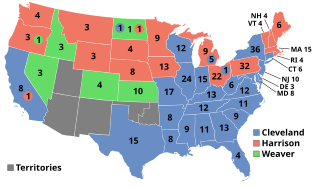
The 1892 United States presidential election was the 27th quadrennial presidential election, held on Tuesday, November 8, 1892. In the fourth rematch in American history, the Democratic nominee, former president Grover Cleveland, defeated the Republican incumbent, President Benjamin Harrison. Cleveland's victory made him the first and, to date, the only person in American history to be elected to a non-consecutive second presidential term. It was also the first of two occasions that incumbents were defeated in consecutive elections—the second being Gerald Ford's loss to Jimmy Carter in 1976, followed by Carter's loss to Ronald Reagan in 1980.

The Prohibition Party is a political party in the United States known for its historic opposition to the sale or consumption of alcoholic beverages and as an integral part of the temperance movement. It is the oldest existing third party in the United States and the third-longest active party.
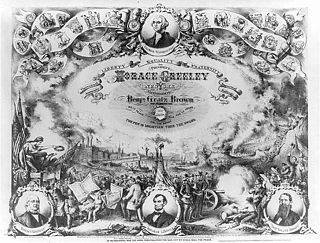
The Liberal Republican Party was an American political party that was organized in May 1872 to oppose the reelection of President Ulysses S. Grant and his Radical Republican supporters in the presidential election of 1872. The party emerged in Missouri under the leadership of Senator Carl Schurz and soon attracted other opponents of Grant; Liberal Republicans decried the scandals of the Grant administration and sought civil service reform. The party opposed Grant's Reconstruction policies, particularly the Enforcement Acts that destroyed the Ku Klux Klan. It lost in a landslide, and disappeared from the national stage after the 1872 election.

The 1860 Republican National Convention was a presidential nominating convention that met May 16–18 in Chicago, Illinois. It was held to nominate the Republican Party's candidates for president and vice president in the 1860 election. The convention selected former representative Abraham Lincoln of Illinois for president and Senator Hannibal Hamlin of Maine for vice president.

James Black was an American temperance movement activist and a founder of the Prohibition Party. Black served as the first presidential nominee of the Prohibition Party during the 1872 presidential election.
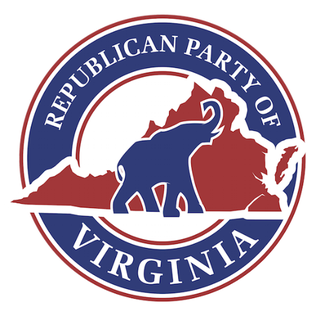
The Republican Party of Virginia (RPV) is the Virginia chapter of the Republican Party. It is based at the Richard D. Obenshain Center in Richmond. As of May 2024, it controls all three statewide elected offices and 5 out of 11 U.S. House seats.

The 1856 Republican National Convention was a presidential nominating convention that met from June 17 to June 19, 1856, at Musical Fund Hall at 808 Locust Street in Philadelphia, Pennsylvania. It was the first national nominating convention of the Republican Party, founded two years earlier in 1854. It was held to nominate the party's candidates for president and vice president in the 1856 election. The convention selected John C. Frémont, a former United States Senator from California, for president, and former Senator William L. Dayton of New Jersey for vice president. The convention also appointed members of the newly established Republican National Committee.
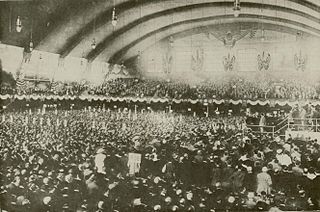
The 1912 Democratic National Convention was held at the Fifth Regiment Armory off North Howard Street in Baltimore from June 25 to July 2, 1912.

The 1872 Democratic National Convention was a presidential nominating convention held at Ford's Grand Opera House on East Fayette Street, between North Howard and North Eutaw Streets, in Baltimore, Maryland on July 9 and 10, 1872. It resulted in the nomination of newspaper publisher Horace Greeley of New York and Governor Benjamin Gratz Brown of Missouri for president and vice president, a ticket previously nominated by the rump Liberal Republican faction convention meeting, also held in Baltimore's newly built premier Opera House of nationally well-known theatre owner/operator John T. Ford of the major Republican Party, which had already re-nominated incumbent President Ulysses S. Grant of the regular Republicans for another term.

James Britton Cranfill was an American religious figure and prohibitionist who served as the Prohibition Party's vice presidential nominee in 1892.

The 1880 Greenback Party National Convention convened in Chicago from June 9 to June 11 to select presidential and vice presidential nominees and write a party platform for the Greenback Party in the United States presidential election 1880. Delegates chose James B. Weaver of Iowa for President and Barzillai J. Chambers of Texas for Vice President.

In 1872, Horace Greeley ran unsuccessfully for President of the United States. He served as the candidate of both the Democrats and the Liberal Republicans, in the 1872 election. In the run-up to the 1872 United States presidential election, major changes occurred in the United States. Specifically, the 15th Amendment gave African Americans the right to vote for the first time, while the government cracked down on the Ku Klux Klan. In addition, the economy was still in good shape and President Ulysses S. Grant's corruption scandals for the most part was still not public knowledge. With this background, the incumbent U.S. President was able to decisively defeat Greeley.
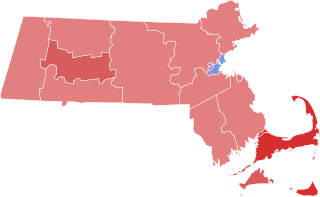
The 1876 Massachusetts gubernatorial election was held on November 7. Incumbent Republican Governor Alexander H. Rice was re-elected to a second term in office over former Minister to Great Britain Charles F. Adams.
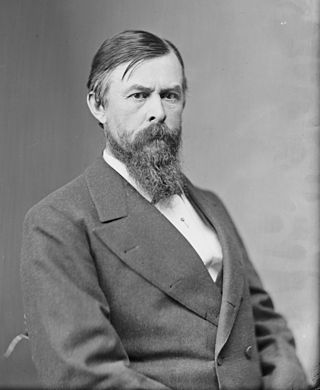
The 1876 Prohibition National Convention was a presidential nominating convention held at Halle's Hall, in Cleveland, Ohio on May 17, 1876, to select the Prohibition Party's presidential ticket for the 1876 presidential election.

Simeon Brewster Chase was an American politician who served in the Pennsylvania House of Representatives and was active in the Prohibition Party.

The 1880 Prohibition National Convention was a presidential nominating convention held at Halle's Hall, in Cleveland, Ohio on June 17, 1880, to select the Prohibition Party's presidential ticket for the 1880 presidential election.

The 1884 Prohibition National Convention was a presidential nominating convention held at Lafayette Hall, in Pittsburgh, Pennsylvania from July 23–24, 1884, to select the Prohibition Party's presidential ticket for the 1884 presidential election.



















